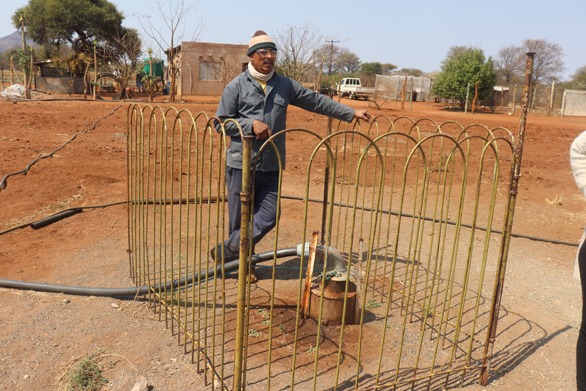Paul pins hopes on potato farming despite challenges
04 Oct 2020
Having already tried many types of horticultural crops with differing degrees of success, Mr Galejewe Paul is determined to nurse his first crop of potato to an enviable harvest.
Mr Paul, 55, was lured to potato farming by the sprawling market for the tuber locally and the fact that the market remains largely untapped has propelled him to take a shot at producing potatoes.
Armed with a life-long experience in farming, having grown up seeing his late father engage in different farming pursuits, the Mr Paul, whose farm sits on the periphery of Ngwapa in the Tswapong region, is determined to play a notable role in helping Botswana become self-sufficient in potato production.
No matter how tiny a fraction of the market he may serve, he desires to do so with unparalleled excellence, giving out a product of unquestionable standards.
“In terms of market, you cannot go wrong with potato production in Botswana.
Remember that this crop goes with a host of menus,” he said, noting also how the market for potatoes is almost similar to that for broilers as the two were often used together in some menus such as in fresh chips and fried chicken.
Mr Paul, a former employee of the Botswana Diamond Valuing Company, who lost his source of income when he got retrenched in 2017, has previously tried sweet potato on a portion of his three-hectare farm, the success of which spurred him to move on to potato farming.
“Tapole e tsala go feta sweet potato. Ditlhatshana tse tharo tsa tapole fa e tsetse sentle di kgona go ntsha 10 kg ya ditapole,” he said, observing that a potato plant yields more produce compared to a sweet potato.
Another thing that drew him to potato farming was the fact that it could be grown all-year round unlike some horticultural crops which were seasonal.
Despite his drive for success, the farmer is worried about the fair share of challenges that horticulture farmers have to grapple with.
Pests and the high costs of controlling them as well as the high costs of buying implements or hiring them from others are major restraints to the possible success that farmers in the horticulture sub-sector could be enjoying.
“Another stumbling block is the steep cost of bringing utilities like power to production areas. Right now, I am sitting on a P145 000 quotation of connecting power to the farm, and I have no idea where I am expected to get such an amount being a small-scale farmer,” he lamented.
Mr Paul self-funded his venture after he hit a brick-wall in efforts to get funding from the Citizen Entrepreneurial Development Agency (CEDA), labeling the process to try and meet the funding requirements a costly undertaking for budding entrepreneurs.
He feels many small-scale farmers have been left out in the cold to fend for themselves while the bulk of the attention is given to young farmers, the majority of whom lack experience in farming or simply lack the desire to pursue farming so as to attain some level of success.
Machaneng-based horticultural officer, Ms Nonofo Gotcha concurs that there is a good market for potato locally and that those into potato farming should thus give its production their best shot.
“We still get a lot of the potato we consume from outside, which means demand locally is still high,” she stated, further noting that the fact that potato farming generally did well locally with not much challenges should be encouraging to those producing it.
“It does quite well. The thing with it is, it won’t perform well when it gets hit by frost, but other than that there are not much challenges with it,” noted Ms Gotcha.
The general lack of potato seeds locally is one of the major challenges, and farmers often have to cross borders to obtain seeds.
However, the recent border closures due to COVID-19 have made obtaining the seed an even more daunting task.
ends
Source : BOPA
Author : Keonee Kealeboga
Location : NGWAPA
Event : Interview
Date : 04 Oct 2020







